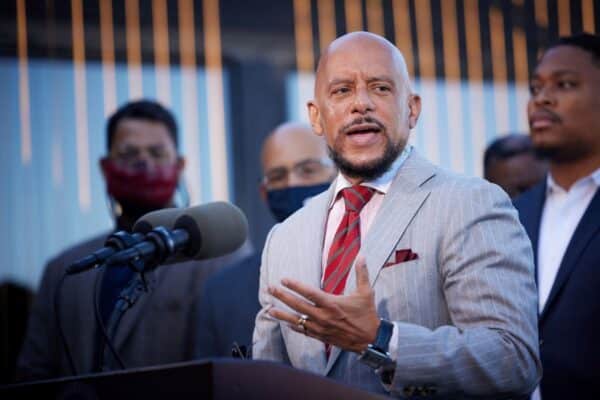Throw support behind federal budget reconciliation package.
Governor Tom Wolf and the Pennsylvania Legislative Black Caucus gathered this week to bolster environmental injustice causes, unveiling new orders for the Pennsylvania Office of Environmental Justice and calling for support of the federal budget reconciliation package.
Environmental justice is defined as the fair treatment and meaningful involvement of all people regardless of race, color, national origin, or income, with respect to the development, implementation, and enforcement of environmental laws and regulations. When many polluting industries are settled in one area, it can have a cumulative effect on local health.
“We can look at any map and determine the quality of one’s education, whether or not they will be denied a mortgage or how hot it is on their exact city block,” said state Rep. Donna Bullock, caucus chair. “We can predict their health, and we can pinpoint their exposure to pollution. Many of these zip codes are often black and brown. Many are low-income. But many of these zip codes are also home to people who have been fighting for cleaner air, cleaner water, and healthier communities, and every Pennsylvanian deserves that.”
They spoke at the Discovery Center, a once-abandoned abandoned water reservoir that has become a wildlife sanctuary in Philadelphia’s Strawberry Mansion neighborhood.
“We are praying our colleagues in Washington will get their work done,” state Sen. Vincent Hughes said. “The reconciliation bill has about a half-trillion dollars dedicated to issues of climate and environment, and it has been structured so that environmental justice will be a wide and clear lens through which those dollars must flow through. That kind of investment, with that kind of lens, can be transformational for decades to come.”
State Rep. Malcolm Kenyatta added, “We need to get this money from the Build Back Better agenda into the communities that need it, most.”
Wolf signed a five-page executive order this week defining the role of Pennsylvania’s existing Office of Environmental Justice and its director, Allison Acevedo. The move was to strengthen the efforts to support low-income communities and communities of color adversely impacted by environmental issues, a press release from Wolf’s office said.
It was prompted in part by the White House Environmental Justice Interagency direction that 40 percent of federal investments benefit disadvantaged communities, Wolf’s executive order said.
The executive order directs Pennsylvania’s Office of Environmental Justice director to make recommendations to the Pennsylvania Department of Environmental Protection Secretary on the integration of environmental justice within its programs and policies; establish an online repository of environmental justice data; and establish an environmental justice mapping tool.
Environmental Justice will be considered in the grant-awarding process. The office is directed to develop a statewide definition and criteria to be considered an Environmental Justice Area.
The DEP secretary is directed to establish an Environmental Justice Advisory Board which will include the secretary or designee of the Department of Conservation and Natural Resources, departments of education, agriculture, health, transportation; and the Department of Community and Economic Development.
This board will identify and make recommendations to the governor’s office to address potential disproportionate environmental impacts that state laws, regulations, policies, and activities may have on Pennsylvania residents in environmental justice areas and recommend to executive agencies a processes to incorporate environmental justice into decision-making.
“Historically, low-income communities and communities of color have borne a disproportionate share of harmful environmental damage,” Wolf said during the press conference. “Those challenges continue today. For example, communities of color and low-income communities are disproportionately affected by pollution by polluting industries, Members of these communities are more likely to live near higher polluting companies, industrial complexes, and service facilities than higher income white communities. They are more likely to be exposed to polluted air … we know asthma rates are the highest among the lowest income Pennsylvanians. Climate change is only exacerbating the economic harms that many vulnerable communities are experiencing.”
Wolf stressed that environmental justice is for everyone.
Maurice Sampson, eastern Pennsylvania director of Clean Water Action, underscored that sentiment. No one should consider environmental justice as limited to black and brown people, it should also apply to decidedly white communities too, Sampson said during the press conference.








